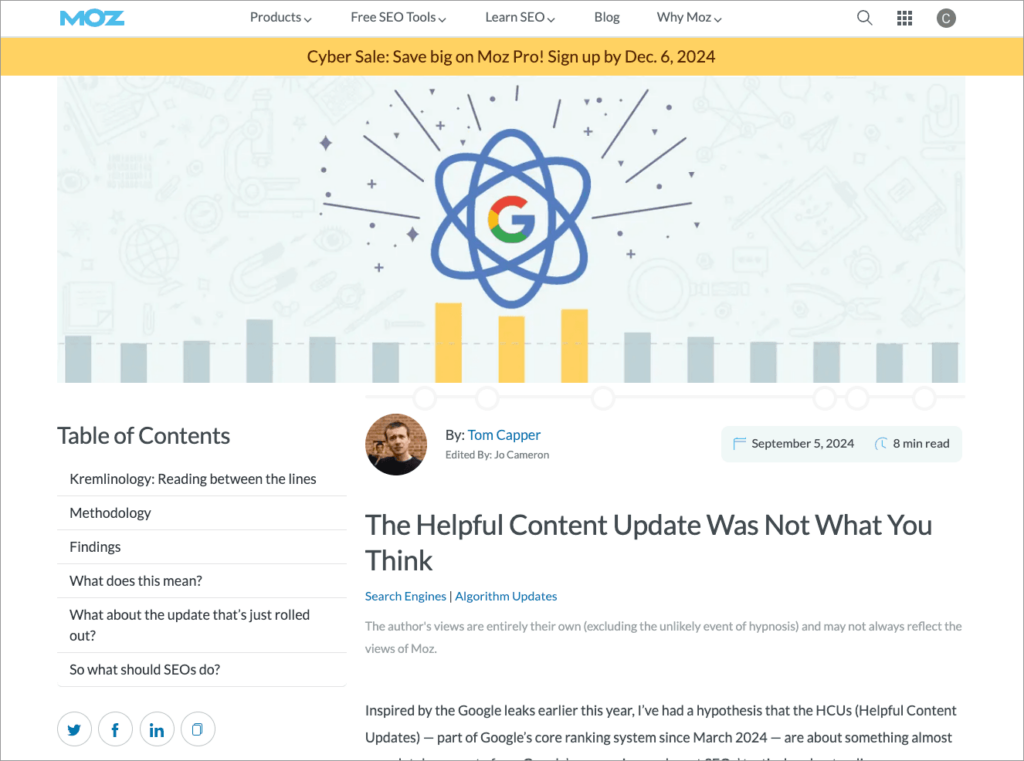
In this post I discuss how an increasing number of SEOs now believe that a solution to the problems caused by Google’s controversial Helpful Content Update may lie with branded search. Read on to find out why — and learn more about how to increase the number of branded searches to your website.
The shifting sands of SEO
For a long time, professional SEOs took the view that getting good Google rankings generally boiled down to three key things: finding out what people are interested in, creating strong content about that topic and building high-quality links to that content.
Over the past year or so however, this view has changed somewhat. While most SEOs still agree that Google generally likes good content that is well-linked to, an increasing number believe that there’s now another core factor that is now crucial to success in search results — and that’s the number of branded searches for a website.
(A branded search being a search query that includes the name of a specific brand, product or service.)
This shift in thinking started in September 2023, with the rollout of Google’s infamous (and still controversial) ‘Helpful Content Update’ (HCU). In the immediate aftermath of this update, niche site owners realised that their previously high-ranking articles were now being pushed far down the search engine results pages — and replaced by posts and discussions on big-name websites (Forbes, Quora, Reddit etc.).
The frustrating thing about this was that the quality of these newly-prioritized search results was very poor — in many cases, the Helpful Content Update had elevated deeply unhelpful content above useful web pages written by genuine experts.
The impact on independent and small publishers was horrific, and many went bust. With the loss of rankings came the loss of traffic, then the decline of advertising revenue.
(And, as anyone who has ever read a Forbes Advisor review of anything can attest, this update was far from helpful to users either.)
Either way, in light of the HCU, many SEOs and publishers started to feel that Google had decided that brand, not content, was now king.
And this view was recently backed up in a study conducted by Tom Capper, head of the Search Science team at Moz. In his intriguing post on the Moz website, The Helpful Content Was Not What You Think, Capper shares compelling data backing up his hypothesis that the HCU was all about penalizing websites that have a lot of links pointing to them, but nobody searching for their brand.

In short, there’s now an emerging consensus that in 2024, branded search is now a significant ranking factor that you need to concentrate on in addition to the tried and tested approaches of keyword research, blogging and link building.
The question for indie publishers and site owners is how. How do you take a site that isn’t particularly well known and turn it into something that a lot of people specifically search for?
Well, as niche site owners that like many others felt the sharp end of the HCU, we’ve been giving this a lot of thought at Style Factory — and below I share some of the strategies that we are currently using to increase the number of searches for our brand.
How to increase branded search
1. Actually create a brand!
For a long time, a lot of site owners focussing on SEO didn’t really have to think much about brand. In a world where setting up a Squarespace or Wix site took literally minutes and Google was happy to reward well-crafted content posted on it, brand was a secondary concern.
It isn’t any more.
So, if you’re a site owner, ask yourself some questions:
- What is the mission of my brand?
- What do I want it to stand for?
- How do I want people to feel when they interact with my brand?
- What are my brand’s core values?
- Who is my ideal customer, and what are their needs, preferences and pain points?
- How does my brand differ from competitors in the industry?
- Is my brand boring?
- What design elements best represent my brand’s personality?
Those are just a few examples of the sort of brand-related questions you should be asking yourself. And the simple truth is that if you don’t know the answer to them, you may not really have a brand to promote at all.
So, before you start worrying about generating searches for your brand, create one.
2. Go beyond Google: take an omni-channel approach to content marketing
Organic search is often all about ‘pull’ marketing: using keywords, content and a knowledge of how Google’s algorithm broadly works to draw people into your content.
But there are many platforms that push people towards it. YouTube, LinkedIn, Facebook and TikTok all in their own way systematically surface content — and are often entirely ignored by site owners who think of traffic only in terms of the organic variety supplied by Google (in ever-decreasing quantities).
So, think omni-channel: don’t just focus on adding pages and posts to your site that you hope Google will pick up on, but create content that works for other platforms too. Done well, this can lead to brand discovery, as platform algorithms push your content to the people who are most likely to find it interesting.
This can in turn lead to a corresponding increase in people actively searching for the brand behind the content they’ve just encounted — yours.
The other benefit of this omni-channel approach is the increased number of brand mentions it may result in (via all your new posts across multiple networks, and shares of them). An omni-channel approach can result more references to your brand in more online locations, which some SEOs believe can have also have a beneficial impact on rankings.
📚Related resource: Five key reasons to make YouTube a big part of your SEO strategy.
3. Ask people to search for your brand
People have got into the habit of dropping links to their website content in social media content. And it’s easy to see why: it’s a straightforward way to drive traffic to a site, particularly if you have a large following.
But what if you didn’t include a link in your social posts, and asked people to Google the content you wanted them to visit instead? This may sound counterintuitive, but it comes with two real benefits.
First, it makes it more likely that your post will be seen by your audience. As I explain in my post about zero click content, social media companies are increasingly suppressing content containing links to external websites, mainly because (for advertising revenue related reasons) they want to keep users on their own platforms.
Second — and of more direct relevance here — is that asking people to search for your content on Google gives you precisely the branded queries you’re looking for. Particularly if you’ve got a large social following, doing this regularly can send the right sort of branded search signals to Google (and get your community used to the idea of searching for your brand too).
So next time you produce a YouTube video, rather than asking people to ‘check the description for a link’ to a related blog post, consider asking them during the video to search for your brand and your blog post title on Google instead.
Or if creating a LinkedIn article, consider publishing an excerpt of a blog post and asking readers to Google the main article title if they want to access the whole thing.
And if running billboard ads for your company or service, include a ‘Search for…’ CTA in the copy.
(Obviously check that your brand is appearing in search results before deploying any of these tactics. But so long as you have a decent online presence, it’s usually pretty easy to rank for your own brand.)
4. Give people a ‘natural’ reason to search for your site name
The most powerful way to get people to search for your site’s name is to give them a powerful reason to come back to it naturally. Thinking about the sites I Google frequently (or navigate directly to via my browser’s address bar), all have one thing in common — they provide me with something that I need to access regularly.
For me, that’s
- news (The Guardian, BBC)
- tools (banking services, code checkers, calculators, search engines)
- discussion (forums, social media sites)
- shopping (Amazon, eBay etc.)
So, think about your site and whether you can introduce a really cool feature, tool or service into it that can fulfil a regular need. If you can, you’re well on the way to generating not just branded searches, but repeat visits (which may contribute positively to ranking too).
5. Use offline marketing approaches to generate awareness of your brand
When engaging in SEO, it’s easy to become fixated on the online side of things — and to focus on Internet-based tactics that lead to more searches for your brand. But there are actually a lot of things that you can do offline that can help on this front.
These include:
- placing ads for your brand in newspapers
- getting interviewed on radio
- speaking engagements
- sponsoring events
- guerrilla marketing and stunts
- direct mail campaigns.
All these offline activities can ultimately lead to more searches for your brand online.
I hope this post has sparked some ideas on how you can move away from a traditional ‘inbound’ traffic SEO approach and place a greater emphasis on generated branded searches — good luck with turning your website into a household name that everybody searches for!
For more tips on SEO make sure you download our free SEO kit, below — or leave a comment if you have any questions.
Don’t miss out on our free SEO toolkit
For a limited time only we’re offering our readers some excellent free SEO tools and resources. Sign up now to immediately receive:
- our downloadable cheatsheet containing the 20 key steps to ranking highly in search results
- extended free trials and discounts for leading SEO tools
- our downloadable cheatsheet on how to grow organic traffic to a blog
- 2 in-depth guides to SEO
- ongoing free tips and advice on SEO and growing your business
No comments